러시아와 우크라이나 전쟁의 장기화 문제.
--------
러시아의 보복 폭격,
놀이터, 대학 등 민간인 지역을 폭격함.
우크라이나 발표. 이날 러시아가 발사한 83개 미사일 중, 43개를 공중에서 폭발시켰다고 함.
미사일 공격을 받은 지역. 키이우 외, Lviv, Kharkiv, Dnipro and Zaporizhzhia
최소 14명 사망.
1. bbc 보도

러시아 보복 공격
https://www.bbc.com/news/world-europe-63208897
Ukraine war: US condemns 'brutal' Russian strikes on Ukraine
Joe Biden says attacks on cities including central Kyiv show the "brutality" of Putin's "illegal war".
www.bbc.com
Ukraine war: US condemns 'brutal' Russian strikes on Ukraine
Russia-Ukraine war
,
Watch: Ukraine's day of missile strikes in a minute
By Paul Adams in Kyiv and Elsa Maishman in London
BBC News
Russia has been widely condemned after bombarding cities across Ukraine, including launching missile strikes on the centre of Kyiv for the first time.
The US said the "brutal" attacks had hit non-military targets, including a university and children's playground, and promised ongoing military aid.
United Nations chief Antonio Guterres said he was "deeply shocked".
Vladimir Putin said the attacks were retaliation for Saturday's explosion on a key bridge linking Russia to Crimea.
Ukraine says 83 missiles were launched of which more than 43 were shot down.
In a defiant video, Ukraine's President Volodymyr Zelensky said that "Ukraine cannot be intimidated. It can only be more united."
The deadly barrage included strikes on the cities of Lviv, Kharkiv, Dnipro and Zaporizhzhia, and were some of the worst Ukraine has seen for months.
At least 14 people were killed and scores more were injured, officials said.
Several regions were left without electricity and water after missiles hit energy infrastructure.
Residents in the capital Kyiv said Russia appeared to be targeting civilian areas which were busy with Monday morning commuters, including the children's playground, university and the popular Taras Shevchenko park.
A crater in the road in Kyiv
Monday's strikes saw central Kyiv targeted for the first time
Antonio Guterres described the strikes as "another unacceptable escalation of the war" for which civilians were paying the highest price.
The EU said a war crime had been committed, while European Commission president Ursula von der Leyen said Russia stood for terror and brutality.
US President Joe Biden was one of many foreign leaders to speak with President Zelensky, and he "pledged to continue providing Ukraine with the support needed to defend itself, including advanced air defence systems", the White House said.
Mr Biden said the attacks demonstrated "the utter brutality" of Putin's "illegal war".
China and India, which have not condemned the war, called for a de-escalation.
ON THE GROUND: Shock and horror as playgrounds and bridges hit
BACKGROUND: Who - or what - blew up the Crimean bridge?
IN RUSSIA: Russian hawks celebrate deadly response to setbacks
Speaking at the UN General Assembly in New York, Sergiy Kyslytsya, Ukraine's Ambassador to the UN, said his family had been in a residential area in Ukraine when it was attacked by the latest Russian missiles and they were unable to go to a bomb shelter.
He said Russia had already killed some of his relatives, calling it "a terrorist state" that must be deterred in the strongest possible ways to prevent further atrocities. He added that Russia's delegation to the UN left "a trail of blood" whenever it entered the General Assembly hall.
The General Assembly is holding an emergency meeting following Russia's latest attacks. Although the session was convened because of the Kremlin's annexation of four partly-occupied Ukrainian regions following sham referendums, it has been overshadowed by this morning's attacks.
Ihor Zhovkva speaking to the BBC's Paul Adams
IMAGE SOURCE,GETTY IMAGES
Image caption,
Ihor Zhovkva speaking to the BBC's Paul Adams
Russian missiles began hitting targets across Ukraine around the morning rush hour on Monday, in the most widespread bombardment of the war.
Ihor Zhovka, deputy head of President Zelensky's office, said they were designed to sow panic.
The strikes were more intense than had previously been seen, he told the BBC, and in some ways resembled the early days of the war.
He added that this had not come as a surprise, and was a sign of things to come during the "very difficult" winter ahead.
Russia's President Putin said the attacks were in retaliation to Saturday's explosion on the bridge linking the occupied Crimea peninsula to Russia which he blamed on Ukraine.
Ukraine has not confirmed it was behind that strike.
Mr Zhovka said he did not entirely believe that the Russian attacks were a retaliation, as Kyiv has been hit before.
Mr Putin warned he was ready to authorise more "severe" attacks, while deputy head of the Russian Security Council Dmitry Medvedev said that "the first episode has been played. There will be others".a

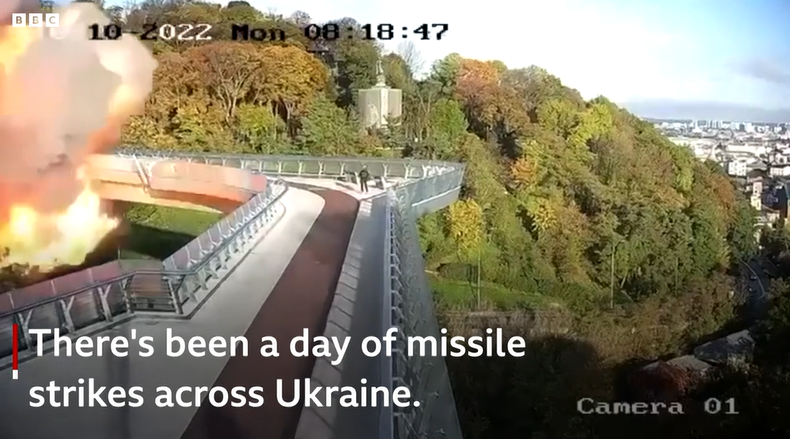

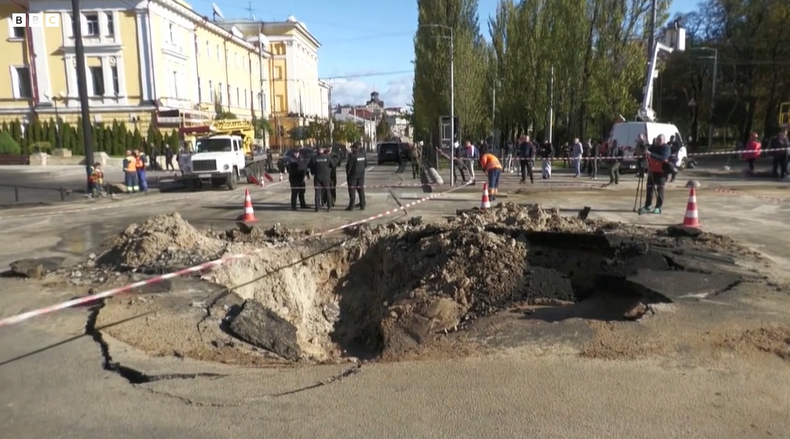

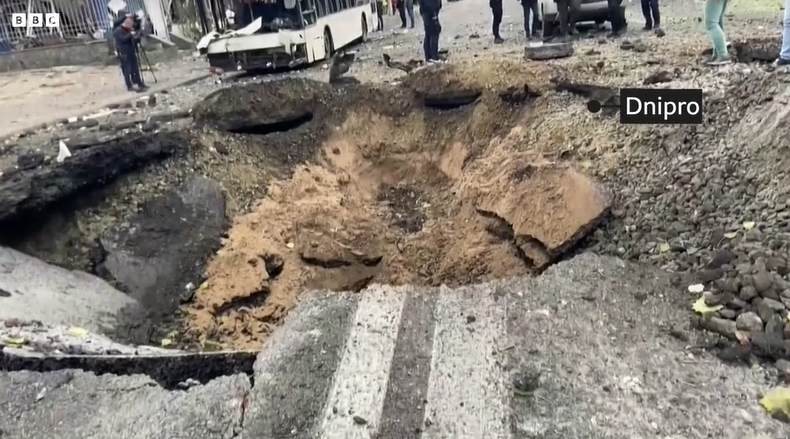

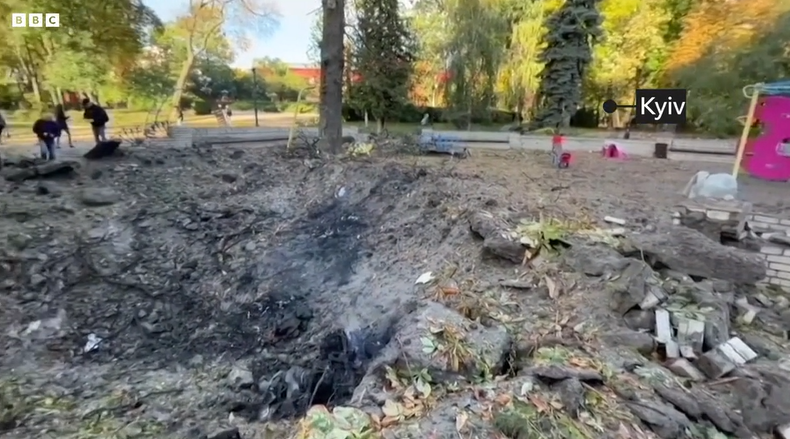
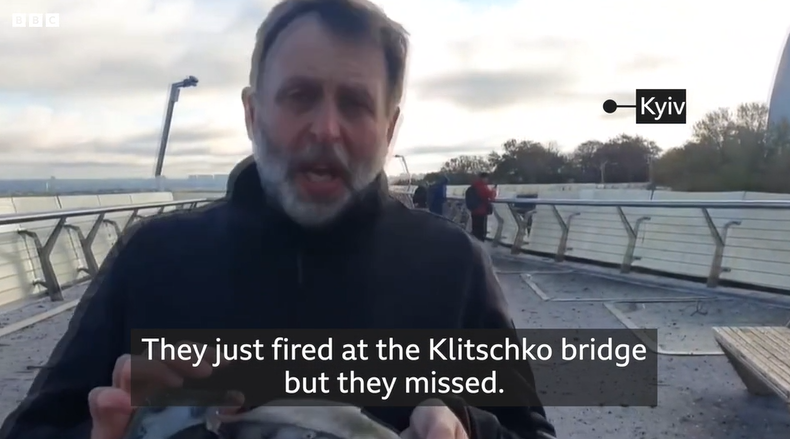
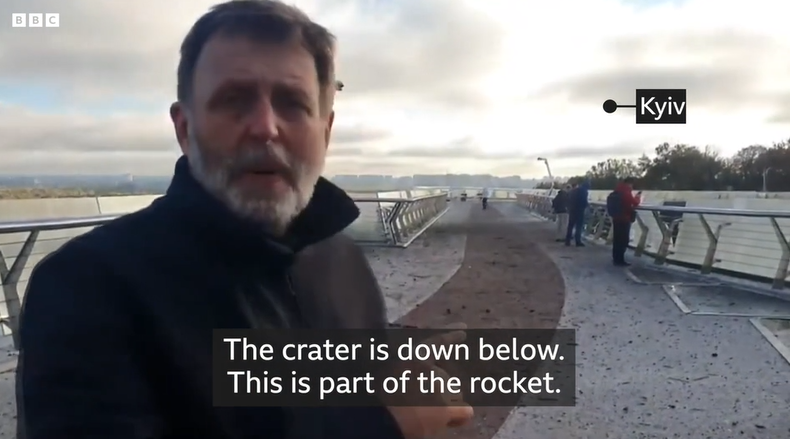



2. guardian 보도.
Ukraine to demand step-change in western aid after Russian missile blitz
Kyiv presses military and diplomatic wishlist as French president sees ‘profound change in nature of this war’
www.theguardian.com
Ukraine to demand step-change in western aid after Russian missile blitz
Kyiv presses military and diplomatic wishlist as French president sees ‘profound change in nature of this war’
Rescuer helps injured woman
A rescuer helps an injured woman in the Ukrainian capital, Kyiv. Photograph: State Emergency Service of Ukraine/AFP/Getty Images
Julian Borger in Washington, Peter Beaumont in Kyiv, and Dan Sabbagh
Mon 10 Oct 2022 20.35 BST
Volodymyr Zelenskiy will address G7 leaders on Tuesday to demand a significant increase in their military and diplomatic support after the biggest Russian missile attack on Ukrainian cities since the start of the war.
The French president, Emmanuel Macron, described the attack, in which cruise missiles and armed drones rained down on parks, playgrounds, power stations and other civilian targets, as “a profound change in the nature of this war”.
When he speaks to a virtual G7 summit on Tuesday, Zelenskiy will be seeking an equally profound change in western backing, which Kyiv complains has consistently lagged behind Ukraine’s requirements to defend its territory and people.
“We are dealing with terrorists,” the Ukrainian president will say. “They have two targets: energy infrastructure and people.”
Zelenskiy’s wishlist will emphasise anti-aircraft systems, and repeat the longstanding demand for longer-range missiles. Diplomatically, Ukraine wants Russia declared a state sponsor of terrorism, and its isolation underlined in a UN general assembly debate beginning on Monday. The assembly is due to debate Russia’s land-grab in the east and south of Ukraine, which the UK ambassador, Barbara Woodward, described as “the largest forcible annexation attempt since the second world war”.
Ukraine’s ambassador to UN labels Russia a 'terrorist state' after missile attacks – video
01:57
Ukraine’s ambassador to UN labels Russia a 'terrorist state' after missile attacks – video
The UN secretary general, António Guterres, was “deeply shocked” by the attacks, his spokesperson said. “This constitutes another unacceptable escalation of the war and, as always, civilians are paying the highest price,” the spokesperson added.
As debate in the assembly began, the Ukrainian ambassador to the UN, Sergiy Kyslytsya, said: “A trail of blood is left behind the Russian delegation when it enters the general assembly and the hall is filled up with the smell of smouldering human flesh.”
Russia attempted to change the rules so that the vote on a resolution condemning the Russian annexation would be secret ballot, but was heavily defeated in successive votes.
People in partially destroyed house
People work to remove debris from a damaged house after an overnight Russian shelling in Sloviansk, Donetsk. Photograph: Andriy Andriyenko/AP
On Monday, Germany announced that it would accelerate the delivery of an Iris-T infrared-guided air defence system, saying the first of four batteries would arrive within days. The US promised two National Advanced Surface-to-Air Missile Systems (Nasams) in July and a US defence official told the Washington Post they should arrive within weeks. Estonia meanwhile, prepared legislation that would designate Russia as a terrorist state.
Zelenskiy spoke to Joe Biden and tweeted later: “Air defence is currently the No 1 priority in our defence cooperation. We also need US leadership with the G7’s tough stance and with support for our [UN general assembly] resolution.”
After the conversation, the White House issued a statement saying Biden “pledged to continue providing Ukraine with the support needed to defend itself, including advanced air defense systems”.
It was not immediately clear whether he was referring to the Nasams already promised.
Earlier the German chancellor, Olaf Scholz, assured Zelenskiy “of the solidarity of Germany and the other G7 states”.
Germany, the current president of the group of wealthy industrialised democracies, will host Tuesday’s virtual summit. A German government spokesperson, Steffen Hebestreit, said on Monday: “Germany will do everything in its power to mobilise additional aid and, in particular, to help repair and restore [Ukraine’s] damaged and destroyed civilian infrastructure, such as the electricity and heating supply.”
Zelenskiy said over 100 projectiles were launched at Ukrainian cities, more than half of which were intercepted by Ukrainian air defence batteries.
Those that got through Ukrainian defences hit civilian targets including a play park and pedestrian bridge that is a tourist attraction in Kyiv. Lviv, Ternópil and Dnipro were among the other cities that were targeted, as well as Zaporizhzhia, where residential areas were bombarded for the third night in a row. At least 14 people are reported to have been killed and scores more injured.
President Zelenskiy
President Zelenskiy will tell G7 leaders to supply Ukraine with anti-aircraft systems and longer-range tanks, and to declare Russia a state sponsor of terrorism Photograph: AP
Vladimir Putin claimed the missile strikes, launched from warships, strategic bombers and Iranian-made drones, were in retaliation for a blast on Saturday that damaged the Kerch bridge joining Russia to the Crimean peninsula, seized from Ukraine in 2014, and warned of even more “severe retaliation” in the event of further Ukrainian attacks.
“Let there be no doubt,” Putin said in televised comments addressed to his security council, “if attempts at terrorist attacks continue, the response from Russia will be severe.”
However, Ukrainian intelligence said the Russian preparations for the attacks on cities and infrastructure began on 2 October, when orders were issued for long-range bomber units to prepare.
The defence ministry’s main intelligence directorate said that seven Tu-160 supersonic strategic bombers had been moved to the “Olenya” airfield south of Murmansk to be loaded with the cruise missiles used against Kyiv and other cities. At the same time, it claimed six warships armed with 40 Kalibr sea-launched cruise missiles were deployed off the Crimean coast.
The intent was to destroy thermal power plants as winter approaches, while seeking to create panic among the civilian population and intimidate Europe.
Western leaders vowed that their support would only be further galvanised by the attacks on civilian targets.
The US ambassador to Kyiv, Bridget Brink, met Zelenskiy and his chief of staff, Andriy Yermak, at the president’s office a few hours after the attack, and the US secretary of state, Antony Blinken, spoke by phone to his opposite number, Dmytro Kuleba.
Car burns in Kyiv
Cars burn in central Kyiv after Russian missile strike. Photograph: Gleb Garanich/Reuters
Zelenskiy also spoke to the UK prime minister, Liz Truss, saying that Ukraine was counting on British leadership “in consolidating international political and defence support for Ukraine, in particular regarding the protection of our skies”.
In her remarks to the G7 on Tuesday Truss is expected to say: “Nobody wants peace more than Ukraine. And for our part, we must not waver one iota in our resolve to help them win it.”
Jeremy Fleming, the head of the British spy agency GCHQ, is expected to say on Tuesday that Putin, insulated from any internal criticism, had made “strategic errors in judgment”.
The focus of the Ukrainian diplomatic effort will be on securing as great a show of Russian isolation as possible at the Unga, where many countries from the global south have up to now abstained, and in pursuing a terrorist designation for Moscow.
Designating Russia as a terrorist state will have different legal implications according to the country taking that step. The US lists four countries as state sponsors of terrorism: North Korea, Iran, Syria and Cuba.
While there has been some pressure in Congress for such a designation to be applied to Russia, it has been resisted by the Biden administration, and some argue that such a designation would be counterproductive.
“The Russian Federation has demonstrated that it is a terrorist state that fights not with the Ukrainian army, but with peaceful citizens,” a Ukrainian source said, adding: “Russia is resorting to the methods of Nazi Germany, which mercilessly bombed European cities during the second world war – London, Coventry, Gdańsk, and many others.”
Ukraine is worried that Russia is seeking to create conditions by the start of the G20 summit in Bali in mid November in which western countries will press Kyiv to start negotiations on terms favourable to Moscow, though there is little sign at the moment of any meaningful cracks in the anti-Putin coalition.

